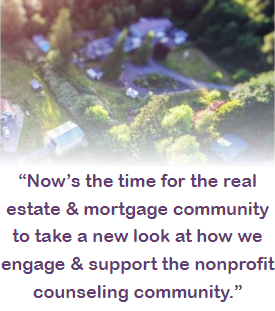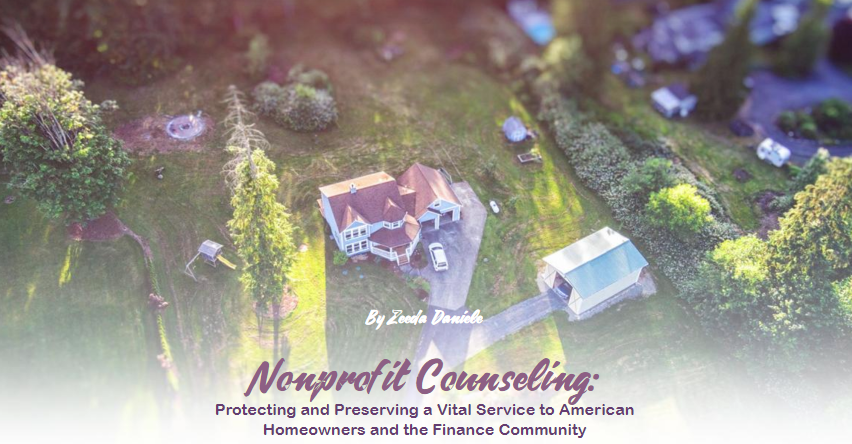The past decade has taught us a great deal about housing loss and preservation. Many of us were personally affected, or know someone affected, by the 2007-08 economic downturn period our country experienced.
There have been several lessons learned. Most of all, we learned that too many U.S residents have too much debt and lack the necessary reserves to weather the slightest bump in their financial lives.
History will argue about what went wrong and who to blame. There were lots of mistakes but there were several good lessons. One was the reminder of the value and need for nonprofit housing advocates, educators and counselors.
We learned that homeowners and homebuyers who took advantage of homeownership, credit and financial literacy counseling fared far better during the housing and economic crisis and avoided foreclosure and delinquency more than homeowners who did not. We learned that pre-purchase education, credit and budgeting courses prevented many homebuyers from buying more than they could afford and taught them to avoid the pitfalls of over leveraging their home and excessive debt.
More importantly, when an educated homebuyer got into trouble, they frequently picked up the phone and asked a nonprofit counselor for help. Homeowners weren’t the only ones calling. The mortgage industry was unprepared to respond to the deluge of customers calling for help and turned to the nonprofit community for solutions and support. The relationship between the mortgage lending and nonprofit communities can sometimes be delicate. On one hand, you have the nonprofit wanting fair, honest, affordable and equitable mortgage solutions and housing opportunities, particularly in underserved, minority and low-income neighborhoods. The lending community shared similar beliefs, but they also believed regulations may have gone too far and that they were doing more than their fair share, while managing risk and protecting the interest of their investors. At times, the lending community considered the nonprofit as a part of a regulatory mandate for doing business rather than a valued partner.
In the early 2000s, things seemed too good tofail. Lenders and prospective buyers were asking why education was necessary. Why spend 8 hours of time with a housing counselor when all they were doing was making the biggest investment of their lives? We were all “grown folks” with the right to decide how much home was affordable and how much debt we could sustain, right?
By 2007, we realized the answer was “maybe,” when thousands of homeowners ran to the nonprofit counseling community for help. The lending community was struggling under the weight of unprecedented stock losses, and increasing Real Estate Owned inventory led them to staff up default and asset management departments while simultaneously trying to find a solution that met the demands of shareholders and addressed the consumer and political outcry for options to keep people in their homes.
Most lenders quickly realized they were in over their heads, that standard default and collection methods weren’t working, and that third-party, mission-driven consumer advocacy was needed to help their mortgage holders manage the maze known as a modification, short sale or deed in lieu process. Mortgage companies needed the sometimes annoying and preachy nonprofit counseling community, and the nonprofit community delivered. At the height of the crisis, it wasn’t unusual for a counselor to work 10 to 12 hours a day, seven days a week. Many collapsed under the weight of becoming too close to the client, the mounds of paperwork and dozens of resubmissions, for too many no’s before finally getting a yes.

Let’s not forget that nonprofits were often up against the pop-up business that branded themselves as debt relief or mortgage solution experts for a hefty price, which frequently abandoned unsuspecting and frightened homeowners leaving the nonprofit counselor to step in at the last minute. We’ll leave this topic for another time.
During the crisis, billions of funds were dedicated to foreclosure prevention and programs like HAMP, HARP and NSP. Many assumed there was a windfall of money being made by nonprofits. This was true for a few, but most nonprofits used the proceeds to increase staff to help struggling homeowners and revive neighborhoods, often at a loss. Like numerous American businesses, nonprofits were forced to reduce employee salaries to keep their doors open, while rallying staff to work harder. Several nonprofit housing organizations buckled under the weight of the crisis and are no longer around. Those that are still here can tell you stories of the internal struggles to balance their commitment to the mission and the needs of American homeowners against the work-life balance of their staff. In short, the nonprofit community helped preserve homeownership for millions of homeowners. Without them the recovery wouldn’t have been possible. They proved themselves to be a formidable and resilient business partner.
Fast forward to 2017, mortgage delinquencies are at historical lows, home values are up, demand for loosening of mortgage credit standards is increasing and the nonprofit housing counseling community that stood on the frontline has slowly become the “as needed only” partner, experiencing a dramatic reduction in grants and resources dedicated to housing counseling and financial literacy because the economy is believed to have recovered. Also, there’s a newfound reliance on technology and a belief that face-to-face counseling has gone the way of the landline phone. I don’t mean to condemn technology, but during the crisis, homeowners demanded “live contact” and would drive hundreds of miles for “eye” contact. Should there be any hiccup in the housing recovery, it’s my bet that consumers will use their smart technology to find a “live” counselor in their community.
So, how do we move forward and embrace change while staying mindful of the past and our proclivity for short term memory? Now’s the time for the real estate and mortgage community to take a new look at how we engage and support the nonprofit counseling community.
Let’s encourage counseling options for every borrower regardless of product, down payment or borrower income, and promote local counseling agencies to go beyond the 800-number referral.
Embrace down payment assistance programs and encourage sellers to look at buyers using down payment assistance programs like any other buyer obtaining a mortgage.
Create innovative business models and opportunities that allow for greater compensation to the nonprofit organization.
Make counseling education before and after homeownership the standard for sustainable and long-term affordable mortgage solutions; not as a regulatory mandate, but as a part of a sound business practice where both nonprofit and for-profit businesses thrive and grow and the homeowner wins.
Finally, let’s stop debating the necessity of housing and financial education.
Zeeda Daniele
Community Lending & Strategic Partnerships National Manager
New American Funding

 Login
Login

